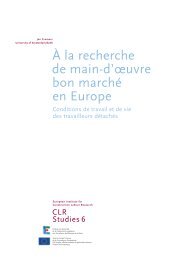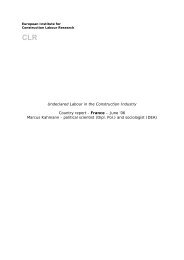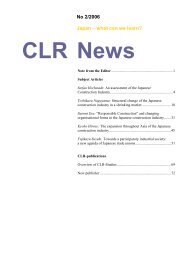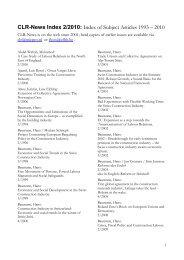SOLIDAR (2010): Social dialogue - Horus.be
SOLIDAR (2010): Social dialogue - Horus.be
SOLIDAR (2010): Social dialogue - Horus.be
You also want an ePaper? Increase the reach of your titles
YUMPU automatically turns print PDFs into web optimized ePapers that Google loves.
The 2008 national collective agreement for the construction industry alsocontains specific measures to protect foreign workers, including:• Vocational training.• Training courses to improve linguistic and intercultural comprehension<strong>be</strong>tween workers of different nationalities.• Training in the organisation and management of the construction site.• Training to prevent injuries.“We often work together withother national trade unionyouth organisations, for exampleon organising the Decent WorkCampaign, taking part togetherin demonstrations and in jointtraining activities. Our role isto promote youth activitieswithin the national trade unioncentres and to get the youthvoice heard in trade unionstructures.”Edita Zitkevic,coordinator for LPSK YouthLithuania:Organising young peopleUntil recently, there were very few young people in trade unions in Lithuania.Young workers have traditionally worked in service sector jobs where therehas <strong>be</strong>en little or no trade union representation. Furthermore, with many elderlyleaders from the old soviet era, the unions were perceived as <strong>be</strong>ing too oldfashioned and failing to defend the interests of youth. Yet they clearly neededan organised force to protect their interests in the wake of the financial crisis,mounting levels of youth unemployment, and the failure of national institutionsto address the issue.Three national trade union centres decided to establish national youthorganisations: Lithuanian Trade Union Confederation (LPSK) Youth, LithuanianLabour Federation (LDF) Youth Organisation and Lithuanian Trade Union‘Solidarumas’ Youth. They bring together mem<strong>be</strong>rs from 14 to 35 years of age,representing young workers’ professional, labour, economic and social rightsand interests. Their main goals are:• To represent the interests of mem<strong>be</strong>rs in relations with employers and stateinstitutions.• To make proposals to social partners when discussing youth-relatedlegislation.• To explain Lithuanian laws to their mem<strong>be</strong>rs and train them in how to uselegislation.• To promote youth civil activeness.• To cooperate with other youth organisations in Lithuania and abroad.The Lithuanian Service Sector Workers’ Union (LPSDPS), a mem<strong>be</strong>r of the LPSK,stands out as a dynamic example of youth organising. Over 60% of its mem<strong>be</strong>rsare under 30. The LPSDPS team has achieved rapid mem<strong>be</strong>rship growth. Thebranch union started its activities in the UAB Lithuania Statoil workers' tradeunion, with 400 mem<strong>be</strong>rs. It now represents 5,000 workers from a wide rangeof sectors including transport, security, the gaming industry, catering, etc.Aleksandras Posochovas, chairman of LPSDPS, outlines the strategies used toensure this mem<strong>be</strong>rship growth. They include active grassroots organising, thetargeting of young individuals and legal representation to protect union mem<strong>be</strong>rsagainst reprisals. The union also <strong>be</strong>nefitted from international training, drawinga lot of inspiration from the Nordic model.12.









